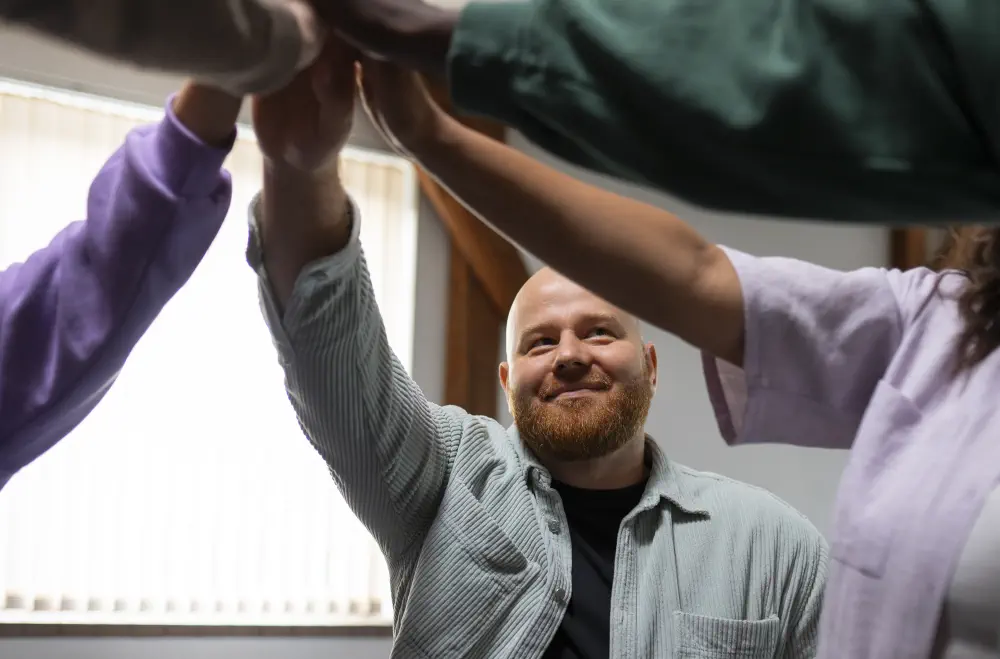We offer medical detox and multiple addiction treatment options in our
luxury treatment centres in Port Hope, Cobourg, and Ottawa.
How to Help Someone with Anxiety?
Anxiety can be a very agonizing and overwhelming experience, not just for the person suffering from it but also for their well-wishers. Knowing how to help someone with anxiety is crucial for supporting them through tough times.
This article aims to educate readers on how to offer meaningful assistance to someone with anxiety through practical tips and strategies to create a supportive environment for their well-being. Whether you're a friend, family member, or caregiver, these insights will equip you with the knowledge and ability to make a difference in their lives.
Key Takeaways
- Understanding Anxiety: Recognize symptoms of anxiety disorders like GAD, Panic Disorder, and Social Anxiety Disorder to offer better support.
- Support Strategies: Encourage exercise, a balanced diet, deep breathing, and routines. Seek help from friends, family, or therapists.
- Consistency and Reliability: Be dependable and consistent in your support to build trust and reduce anxiety.
- Long-Term Support: Provide emotional support, validate feelings, and encourage regular activities to help them develop coping strategies.

What Is Anxiety?
Anxiety is a normal body response to stress, but anxiety disorders involve persistent, high levels of anxiety that interfere with daily life. The most common anxiety disorders are Generalized Anxiety Disorder (GAD), Panic Disorder, and Social Anxiety Disorder.
GAD is diagnosed when a person has excessive and uncontrollable worry about various aspects of their life, such as work, health, and relationships. The person feels that he or she worries excessively about most things during most days and finds it hard to control these worries. Common symptoms include feeling on edge, tired, irritable, tense, restless, and having trouble concentrating due to continuous worry.
Expressed in Attacks recurrently, Panic Disorder is a sudden overthrow by overwhelming fear, accompanied by palpitations, sweating, shaking, shortness of breath, chest pain, dizziness, and a feeling of losing control or dying. As a result, people often avoid situations, restricting daily activities and social interactions.
Social Anxiety Disorder (Social Phobia) is a fear, especially, of situations in which a person may be judged or evaluated. This creates distressing or feared anxiety about possible embarrassment, leading to the avoidance of social situations. Physical symptoms may include blushing, sweating, and trembling, which can significantly affect social, academic, and professional life.
Common Symptoms of Anxiety
Common symptoms of anxiety include persistent fear or worry, increased heart rate, muscle tension, and avoidance of situations that raise anxiety. These symptoms affect many areas of life, including:
- Work: Concentration difficulties and lower productivity.
- School: Concentration problems, test anxiety.
- Relationships: Strained interactions, withdrawal from social situations.
- Health: Headaches and digestive issues.
- General well-being: Reduced enjoyment of life and difficulty with usual activities.
Understanding the issues and effects of anxiety disorders is essential in order to offer support in the best capacity. This can be achieved by recognizing symptoms and showing empathetic and practical support.

What to Say and What Not to Say
One of the most powerful aspects of supporting a person with anxiety is knowing what to say and what not to say. This section will help you communicate effectively by showing you how to use comforting, helpful words and pointing out phrases that could do more harm than good.
How to Deal with Anxiety
There are many ways to help manage anxiety. First of all, practice deep breathing and learn how to calm your mind. Exercise regularly and eat a balanced diet to help reduce symptoms. Establish a routine and set small goals to feel more in control.
Lastly, seek support from friends or family members or a professional therapist who can provide advice and techniques for coping better. This can be an incremental process, with minor improvements adding up to significant differences in managing anxiety.
We can divide all phrases into anxiety supportive and collocations to avoid. Let’s analyze both categories:
Anxiety Help Phrases
The words you use can make a big difference in how comfortable and trusting a person with anxiety will be with you. Here are examples of supportive phrases and why they work:
- I'm here for you. Reassure them that they are not alone and that you are there for support.
- It's okay to feel this way. Validating their emotions helps them feel understood and less alone in their experience.
- How can I help you right now? Offering specific help shows that you'll do something meaningful for them to help and empowers control.
- Take your time; there's no rush. Reduces pressure and lets the person go at their pace, which can be soothing.
- Let's take a few deep breaths together. Suggests something calming to do together, providing support and a practical way to address their anxiety.

Phrases to Avoid and Their Negative Impact
There may be specific phrases that appear counterproductive or even harmful when speaking to somebody who has anxiety. The following are some examples and the reasons they should be avoided:
- Just calm down. This can be very dismissing and might leave the person feeling belittled, misunderstood, and more anxious.
- It's all in your head. The patient feels that this statement invalidates their experience, making him or her think that their emotions are not real or important.
- You have nothing to worry about. Devalues feelings and implies that anxiety is illogical, offering little help.
- Other people have it worse. Comparing their situations to others can make them feel guilty or ashamed about their anxious.
- Just think positive. This oversimplifies the complexity of anxiety and can undermine their experience.
Why the Right Words Matter
Supportive words can create a safe and understanding atmosphere for someone with anxiety, while dismissive or minimizing remarks can increase stress and isolation. It's crucial to choose your words carefully, as they can make a significant difference for those who suffer from anxiety.

Why Consistency and Reliability Are Important?
That means a lot more than simply being nice to those who are undergoing this certain disorder; it means being really present at all times. These qualities help build trust so that an individual might feel as though they are supported in a stable manner and giving them a sense of safety and understanding.
Offering Predictability Through Consistency
Consistency offers predictability, and for those with anxiety, it can be really soothing. When they know they can count on you, it lowers the level of uncertainty and stress they experience. For example, a text to check in every week at the same time introduces a regular pattern. Trust is also built with reliability; by following through on your words with your actions, the person with anxiety learns that you are reliable, and they can plan for when they may need your support. If you say you will be at something important to them, be there; just by showing up, you will reassure them that they are not alone.
Providing Emotional Support
Constant emotional support makes the person feel needed and understood. Showing them that one really cares about their well-being by continually listening to them without judgment and by validation lets the person realize that you care and understand. Such stable support brings the feeling of safety – this is extremely important for an anxious person. Knowing there is a place to get support makes them feel more safe and grounded. Doing activities together, such as walking and coming to therapy every week, provides an ongoing, consistent presence to help them feel a sense of safety about the world.
Encouragement and Reassurance
These consistent words of encouragement and reassurance, along with showing them how they are on the right path and various strengths, will increase their self-esteem and motivation to a higher level so they can really continue coping well. A stable pattern of this nature creates a background of consistency and reduces anxiety through structure and predictability. In that case, it provides an opportunity for the person to focus on their well-being, minus the added stressor – unpredictability. Being able to engage and elicit regular activities, like exercising, meditating, or doing their hobbies, makes it easier for them to enjoy a stable environment, which will help promote their state of mental health.
Developing Deep Trust
Deep trust develops through consistent and predictable behavior. When the person knows they will be listened to and understood, they feel more comfortable sharing their thoughts and fears. A secure support system will comfort a person, knowing for sure that a relationship with you will always be okay and safe. That is very important while guiding them into the anxiety, as they know there is a friend behind their back all the time. What's more, with consistent support, the anxious person in question becomes better equipped to heal themselves. Your dependability and availability can motivate someone to regain and practice healthy coping strategies.

FAQ
How does one approach a person with anxiety?
Approach calmly and unobtrusively. Use a reassuring, gentle tone and let them know you are there for them. Avoid being brusque or incredulous at their emotions.
What are some supportive things I can say to someone with anxiety?
"I'm here for you," "It's okay to feel this way," "How can I help you right now?", and "Let's take a few deep breaths together." These messages, rooted in empathy and understanding, do not minimize their experience.
What should I not say to someone who is anxious?
Avoid saying "Just calm down," "It's all in your head," "You have nothing to worry about," "Other people have it worse," or "Just think positive." These responses can sound dismissive and make the person feel unheard.
How can I help someone with anxiety long-term?
Be dependable and constant in your support. Follow up, listen impartially, and validate their feelings. Engage in routine activities together, like walking or hobbies, to establish a solid support environment.
What are some practical ways to help someone manage their anxiety?
Encourage deep breathing, meditation, and exercise. Help them establish a routine to make some aspects of life more predictable. Offer to accompany them to therapy or support groups.
How can you help someone during a panic attack?
Stay calm and reassuring, prompting slow, deep breaths. Guide them toward something grounding, like their breathing or an object in the room. Remind them that the panic attack will pass.
How important is it to validate someone's feelings in times of anxiety?
Validation is crucial. It makes the person feel that he is understood, and feels less alone in his experience. Showing that you understand their feelings without judgment demonstrates respect and concern for their emotions.
How can I help someone who has anxiety?
Supporting someone with anxiety can be taxing, so it's essential to care for your mental health. Set boundaries, seek help for yourself, and ensure you have time for self-care to avoid feeling overwhelmed.
How do I get the person to go to a doctor/counselor?
Bring it up delicately, and offer to help them find a therapist or support group. Emphasize the benefits of professional help and offer to accompany them to their first session if they are comfortable with it.
What should I do if someone's anxiety is significantly affecting their daily life?
Encourage them to see a therapist or counselor and support them through the process. Remind them that seeking help is a sign of strength, not weakness.






